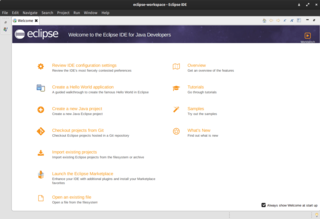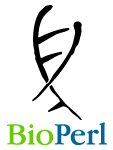Related Research Articles
Python is an interpreted, high-level and general-purpose programming language. Python's design philosophy emphasizes code readability with its notable use of significant whitespace. Its language constructs and object-oriented approach aim to help programmers write clear, logical code for small and large-scale projects.

Eclipse is an integrated development environment (IDE) used in computer programming. It contains a base workspace and an extensible plug-in system for customizing the environment. Eclipse is written mostly in Java and its primary use is for developing Java applications, but it may also be used to develop applications in other programming languages via plug-ins, including Ada, ABAP, C, C++, C#, Clojure, COBOL, D, Erlang, Fortran, Groovy, Haskell, JavaScript, Julia, Lasso, Lua, NATURAL, Perl, PHP, Prolog, Python, R, Ruby, Rust, Scala, and Scheme. It can also be used to develop documents with LaTeX and packages for the software Mathematica. Development environments include the Eclipse Java development tools (JDT) for Java and Scala, Eclipse CDT for C/C++, and Eclipse PDT for PHP, among others.

BioRuby is a collection of open-source Ruby code, comprising classes for computational molecular biology and bioinformatics. It contains classes for DNA and protein sequence analysis, sequence alignment, biological database parsing, structural biology and other bioinformatics tasks.
BioJava is an open-source software project dedicated to provide Java tools to process biological data. BioJava is a set of library functions written in the programming language Java for manipulating sequences, protein structures, file parsers, Common Object Request Broker Architecture (CORBA) interoperability, Distributed Annotation System (DAS), access to AceDB, dynamic programming, and simple statistical routines. BioJava supports a huge range of data, starting from DNA and protein sequences to the level of 3D protein structures. The BioJava libraries are useful for automating many daily and mundane bioinformatics tasks such as to parsing a Protein Data Bank (PDB) file, interacting with Jmol and many more. This application programming interface (API) provides various file parsers, data models and algorithms to facilitate working with the standard data formats and enables rapid application development and analysis.

BioPerl is a collection of Perl modules that facilitate the development of Perl scripts for bioinformatics applications. It has played an integral role in the Human Genome Project.

The Biopython project is an open-source collection of non-commercial Python tools for computational biology and bioinformatics, created by an international association of developers. It contains classes to represent biological sequences and sequence annotations, and it is able to read and write to a variety of file formats. It also allows for a programmatic means of accessing online databases of biological information, such as those at NCBI. Separate modules extend Biopython's capabilities to sequence alignment, protein structure, population genetics, phylogenetics, sequence motifs, and machine learning. Biopython is one of a number of Bio* projects designed to reduce code duplication in computational biology.

Free and Open source Software Developers' European Meeting (FOSDEM) is a non-commercial, volunteer-organized European event centered on free and open-source software development. It is aimed at developers and anyone interested in the free and open-source software movement. It aims to enable developers to meet and to promote the awareness and use of free and open-source software.
Selenium is a portable framework for testing web applications. Selenium provides a playback tool for authoring functional tests without the need to learn a test scripting language. It also provides a test domain-specific language (Selenese) to write tests in a number of popular programming languages, including C#, Groovy, Java, Perl, PHP, Python, Ruby and Scala. The tests can then run against most modern web browsers. Selenium runs on Windows, Linux, and macOS. It is open-source software released under the Apache License 2.0.
The Open Source Geospatial Foundation (OSGeo), is a non-profit non-governmental organization whose mission is to support and promote the collaborative development of open geospatial technologies and data. The foundation was formed in February 2006 to provide financial, organizational and legal support to the broader Free and open-source geospatial community. It also serves as an independent legal entity to which community members can contribute code, funding and other resources.
Google Developers is Google's site for software development tools and platforms, application programming interfaces (APIs), and technical resources. The site contains documentation on using Google developer tools and APIs—including discussion groups and blogs for developers using Google's developer products.
BioPHP is a collection of open-source PHP code, with classes for DNA and protein sequence analysis, alignment, database parsing, and other bioinformatics tools. BioRuby is released under the GNU GPL version 2 licence and is one of a number of Bio* projects, designed to reduce code duplication. As an open source bioinformatics project, BioPHP is affiliated with the Open Bioinformatics Foundation.
Coding conventions are a set of guidelines for a specific programming language that recommend programming style, practices, and methods for each aspect of a program written in that language. These conventions usually cover file organization, indentation, comments, declarations, statements, white space, naming conventions, programming practices, programming principles, programming rules of thumb, architectural best practices, etc. These are guidelines for software structural quality. Software programmers are highly recommended to follow these guidelines to help improve the readability of their source code and make software maintenance easier. Coding conventions are only applicable to the human maintainers and peer reviewers of a software project. Conventions may be formalized in a documented set of rules that an entire team or company follows, or may be as informal as the habitual coding practices of an individual. Coding conventions are not enforced by compilers.
DLTK — is a tool for vendors, researchers, and end-users who rely on dynamic languages. DLTK is a set of extensible frameworks designed to reduce the complexity of building full featured development environments for dynamic languages such as PHP and Perl. Besides a set of frameworks DLTK provides exemplary Tcl, Ruby, Javascript and Python development environments.

Cloud9 IDE is an Online IDE, published as open source from version 2.0, until version 3.0. It supports multiple programming languages, including C, C++, PHP, Ruby, Perl, Python, JavaScript with Node.js, and Go.
Apache Attic is a project of Apache Software Foundation to provide process and solutions to make it clear when an Apache project has reached its end-of-life. The Attic project was created in November 2008. Also the retired projects can be retained.
.NET Bio is an open source bioinformatics and genomics library created to enable simple loading, saving and analysis of biological data. It was designed for .NET Standard 2.0 and was part of the Microsoft Biology Initiative in the eScience division.
Microsoft, a technology company once known for its opposition to the open source software paradigm, turned to embrace the approach in the 2010s. From the 1970s through 2000s under CEOs Bill Gates and Steve Ballmer, Microsoft viewed the community creation and sharing of communal code, later to be known as free and open source software, as a threat to its business, and both executives spoke negatively against it. In the 2010s, as the industry turned towards cloud, embedded, and mobile computing—technologies powered by open source advances—CEO Satya Nadella led Microsoft towards open source adoption although Microsoft's traditional Windows business continued to grow throughout this period generating revenues of 26.8 billion in the third quarter of 2018, while Microsoft's Azure cloud revenues nearly doubled its revenue.
References
- 1 2 3 "Open Bioinformatics Foundation" . Retrieved 1 September 2014.
- ↑ "BOSC – Open Bioinformatics Foundation" . Retrieved 1 September 2014.
- ↑ "Google Summer of Code – Open Bioinformatics Foundation" . Retrieved 1 September 2014.
- ↑ "Open Bioinformatics Foundation". google-melange.com. Retrieved 1 September 2014.
- ↑ "obf". spi-inc.org. Retrieved 1 September 2014.
- ↑ "Board Elections – Open Bioinformatics Foundation" . Retrieved 15 December 2020.
- ↑ "Board – Open Bioinformatics Foundation" . Retrieved 1 September 2014.
- ↑ "Projects – Open Bioinformatics Foundation" . Retrieved 1 September 2014.